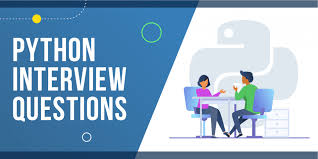Preparing for a Python interview can be a challenging task, whether you’re a beginner or an experienced programmer. Python’s versatility and extensive range of applications mean that interviews can cover a wide array of topics, from basic syntax to advanced concepts. This guide aims to help you prepare effectively by covering essential topics and providing insights into common Python interview questions.
Understanding the Basics: Interpreter in Python
One of the fundamental aspects of Python you need to understand is its interpreter. Python is an interpreted language, meaning its code is executed line-by-line by an interpreter. This contrasts with compiled languages, where the code is first translated into machine code by a compiler before execution. The interpreter in Python makes it easier to test and debug code because you can execute it interactively and see results immediately.
Key Characteristics of Python Interpreter
- Interactive Mode: The interpreter in Python allows you to test snippets of code interactively. This is particularly useful for beginners who want to understand how different parts of the language work.
- Portability: Python code can run on any machine that has the interpreter installed. This makes it highly portable across different platforms.
- Dynamic Typing: With the interpreter, Python supports dynamic typing, meaning you don’t need to declare the data type of a variable explicitly.
- Ease of Debugging: Since the interpreter executes code line-by-line, it is easier to pinpoint errors and debug the code.
Understanding how the interpreter in Python works is crucial, as it forms the basis of how Python code is executed. This knowledge will also help you answer related python interview questions effectively.
Core Python Concepts to Master
Data Structures
Python has a variety of built-in data structures that you need to be familiar with. These include lists, tuples, sets, and dictionaries. Each of these data structures has its own use cases and performance implications.
- Lists: Ordered, mutable collections of items. Useful for storing sequences of items.
- Tuples: Ordered, immutable collections of items. Useful for fixed collections.
- Sets: Unordered collections of unique items. Useful for membership testing and eliminating duplicates.
- Dictionaries: Unordered collections of key-value pairs. Useful for fast lookups and associative arrays.
Functions and Modules
Functions are reusable blocks of code that perform a specific task. Understanding how to define and use functions is critical. Modules are files containing Python code that can be imported and used in other Python programs, promoting code reusability.
Object-Oriented Programming (OOP)
Python supports OOP, which is a paradigm based on the concept of objects. Key concepts include:
- Classes and Objects: Classes are blueprints for creating objects (instances).
- Inheritance: Mechanism for creating a new class that inherits attributes and methods from another class.
- Polymorphism: Ability to redefine methods in derived classes.
- Encapsulation: Restricting access to certain details of objects.
Exception Handling
Exception handling is crucial for writing robust code. Python provides try-except blocks to handle exceptions gracefully. Understanding how to handle different exceptions can help you write error-resistant programs.
Common Python Interview Questions
Preparing for python interview questions is essential. Here are some typical questions you might encounter:
Basic Questions
- What is the difference between == and is in Python?
- == checks for equality of values, while is checks for identity (whether they are the same object in memory).
- How does Python manage memory?
- Python uses a private heap to manage memory. The allocation of heap space for Python objects is done by Python’s memory manager.
- What are Python’s built-in data types?
- Python supports several built-in data types including integers, floats, strings, lists, tuples, sets, and dictionaries.
Intermediate Questions
- Explain list comprehensions and provide an example.
- List comprehensions provide a concise way to create lists. Example: [x for x in range(10) if x % 2 == 0] creates a list of even numbers from 0 to 9.
- What is a lambda function?
- A lambda function is a small anonymous function defined using the lambda keyword. Example: lambda x: x + 1.
- How do you handle exceptions in Python?
Exceptions are handled using try-except blocks. Example:
python
Copy code
try:
# code that may raise an exception
except SomeException as e:
# code that handles the exception
Advanced Questions
- Explain the Global Interpreter Lock (GIL).
- The GIL is a mutex that protects access to Python objects, preventing multiple threads from executing Python bytecodes at once. This can be a bottleneck in CPU-bound multi-threaded programs.
- What are decorators and how are they used?
- Decorators are functions that modify the behavior of another function. They are used with the @decorator_name syntax.
- What are metaclasses in Python?
- Metaclasses are classes of classes. They define how classes behave and can be used to modify class creation.
Final Tips for Your Python Interview
- Understand the Job Requirements: Tailor your preparation to the specific role you are applying for. Some roles may require more knowledge of web frameworks like Django or Flask, while others might focus on data analysis with libraries like Pandas and NumPy.
- Practice Coding: Use platforms like LeetCode, HackerRank, or CodeSignal to practice coding problems. This will help you get comfortable with writing code under time constraints.
- Review Your Projects: Be prepared to discuss your past projects. Highlight the challenges you faced, how you solved them, and the impact of your work.
- Stay Updated: Python is constantly evolving. Make sure you are aware of the latest updates and best practices.
- Mock Interviews: Conduct mock interviews with friends or use platforms that offer mock interview services. This can help you get used to the format and reduce anxiety.


